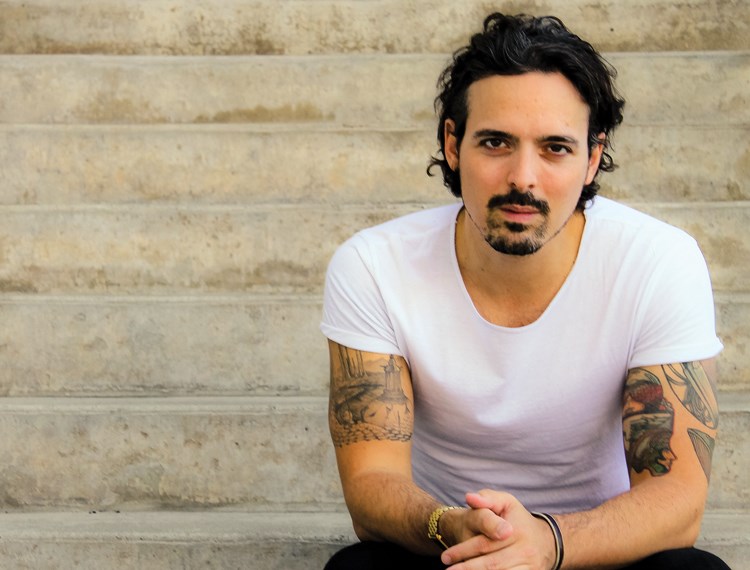ITSAZOO presents Wet in the Russian Hall Basement (600 Campbell Ave., Vancouver). Play runs until May 27, on various days and showtimes. Tickets: $29, $25. Previews and May 15: $10 at door. Box Office: theatrewire.com. For more information visit: itsazoo.org.
Things were different when she got back.
She’d suffered a head injury while deployed in Afghanistan, fighting on behalf of her country, only to return home from active duty to find a strange fogginess had emerged within.
She had trouble reconnecting with her husband and child; she fell into a near-catatonic state. Something was definitely wrong, but where exactly the problem lay, assuming there was one, remained unclear.
The horrors of war have been well-documented, but what happens after the fighting has stopped – or, more likely, faded away from public consumption – and the troops come home?
Artist and writer David James Brock doesn’t describe his play Wet, which is having its Western Canadian premiere at the Russian Hall in Vancouver until May 27, as a straight war drama. However, the play does document at least one soldier’s experience of overseas combat and attempts to look at some of the societal challenges that the soldier, named Burns, faces in the shadow of war after coming home.
“I didn’t necessarily want to write something that was completely antiwar,” Brock tells the North Shore News, adding that making assumptions about a person’s experience of war would be belittling. “I think a playwright who’s fairly privileged writing about the horrors of war is something I’m uncomfortable with.”
Instead, he listened, absorbing stories about the experience of being a solider from anyone generous enough to share their story. The crux of the play itself, however, stems from a more personal incident.
“I had a friend who was a female solider who had just come back from her tour,” he says. “I knew her before, and when she came back there was a difference. It was something that she must have felt as much as any of us.”
Brock started writing Wet in 2008 during the height of Canada’s involvement in the Afghanistan War. He finished it three years later, just when the country’s combat role overseas was coming to an end.
The play starts with Burns in active duty while her husband and child remain at home.
“She’s really eager to get into the action but when she comes back she’s not healthy. The frustration is that no one can quite figure what’s wrong with her, including the military, which is why they’re struggling to get their benefits,” Brock says.
Scene after scene, the characters search for answers. They always seem to come back empty.
While post-traumatic stress disorder might seem like an obvious diagnosis for the lead character’s withdrawn state, Brock contends that PTSD doesn’t manifest itself in one specific way and the aftermath of war could look different from person to person. It could include issues with addiction and mental health, financial burdens, family and relationships problems, or perhaps it’s possible the individual doesn’t experience anything negative after their tour of duty wraps up and they return home.
“It’s not one thing we saw from Vietnam movies or Oliver Stone movies,” he says. “It manifests itself in so many different ways, depending particularly on what you actually did.”
Adding to the tension, Brock says, is the special staging that production company ITSAZOO and director Chelsea Haberlin have envisioned for the play’s premiere.
Using immersive staging techniques to make site-specific depictions of the play’s two settings – an army barracks in Afghanistan and a basement apartment in Chilliwack – the action of the play will emerge mere inches from the audience as the Russian Hall is turned into an army barracks in one instant and the theatre’s basement is turned into an actual basement apartment the next.
“Their setting is a real obstacle,” Brock says about the characters’ dilemma: “The claustrophobia and the feeling of never being able to get into their dream house or dream job. … The audience will go into the tent and be sitting along the walls watching the play and then will move in the second half into the basement apartment and literally be in that cheap-basement apartment feeling.”
Brock resides in Toronto now, but he lived in North Vancouver for several years in the early 2000s after moving here from Winnipeg. He was in his early 20s, in a new city, and found he needed something to pass the time in the evenings.
“I started doing community theatre,” he says, jumping at the chance to do whatever they needed him to do at Deep Cove Shaw Theatre, from props, lighting, sound design, and more. It was only a matter of time before he started writing his own plays.
Asked what he hopes audiences will walk away with after seeing Wet, he says that since the play offers no easy or clear answers he’s open to multiple reactions and interpretations.
“For me writing it, it’s changed my experience on what the solider experience is,” he says. “I’d like something in the play to spark a curiosity and maybe a conversation after.”



